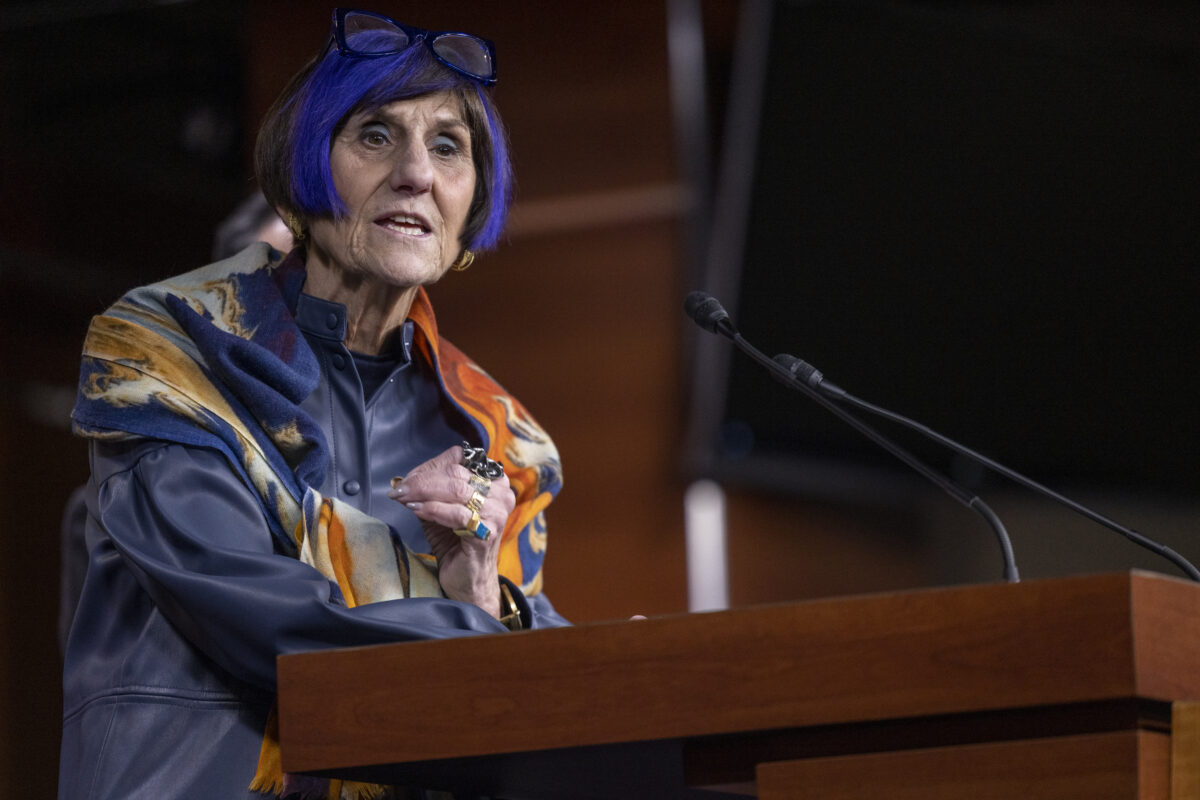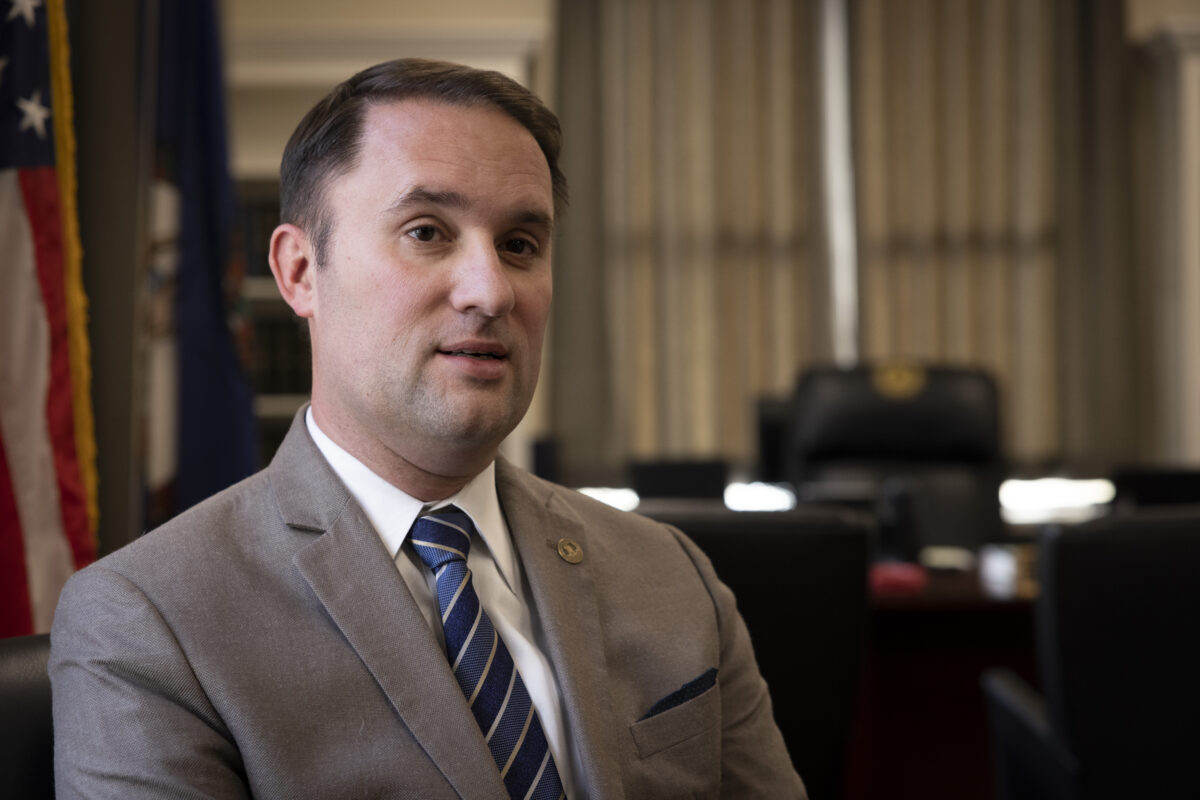Daily Kickoff
Good Monday morning.
In today’s Daily Kickoff, we report on the sticking point holding up the Israel-Hamas cease-fire talks, and look at the Democratic candidates’ positions on Israel in a House race in Silicon Valley. Also in today’s Daily Kickoff: Rep. Rosa DeLauro, Virginia AG Jason Miyares and Israeli Minister Benny Gantz.
Israeli war cabinet Minister Benny Gantz arrived in Washington last night ahead of a critical day of meetings at the White House with Vice President Kamala Harris, National Security Advisor Jake Sullivan and Coordinator for the Middle East and North Africa Brett McGurk, as well as Secretary of State Tony Blinken tomorrow, Jewish Insider’s Lahav Harkov reports. Gantz plans to go from Washington to London for further meetings and to return to Israel on Wednesday.
Harris called yesterday for “an immediate cease-fire, for at least the next six weeks,” citing the “humanitarian catastrophe” in Gaza and urging Hamas to accept the deal that is on the table. Her comments are in line with the Biden administration’s messaging on the issue over the last several weeks. She followed up her call with a tweet on Sunday calling the situation in Gaza “devastating.”
“As we’ve said,” she continued, “there is a deal on the table that includes a 6-week ceasefire, which would get hostages out and aid in. Hamas needs to accept it.”
Gantz’s trip stirred up controversy in Jerusalem, since Israeli Prime Minister Benjamin Netanyahu — who missed Sunday’s cabinet meeting due to “a light flu,” according to his spokesman — did not give the necessary authorization. Gantz’s office said that the Prime Minister’s Office approved the trip in writing on Friday, saying the office only needed a final OK from Netanyahu. Gantz called the prime minister later that day to coordinate messaging for the trip, but Netanyahu refused, saying “there is only one prime minister,” according to Kan, and that Gantz should have asked Netanyahu before he set up meetings.
Likud ministers slammed Gantz, with Dudi Amsalem accusing him of being a “Trojan horse” and warning him against “stop[ping] the IDF from winning the war.” Transportation Minister Miri Regev accused Gantz of “subversion,” and said “he’s traveling there to speak for himself; he can’t make any decisions.”
The miscommunication over Gantz’s Washington visit added to existing political tensions after Defense Minister Yoav Gallant’s demand for a consensus law to conscript more Haredi 18-year-olds to the IDF threw the coalition into turmoil.
Meanwhile in North Carolina and Texas, in advance of two open-seat House primaries on Tuesday, AIPAC’s political action committee has endorsed a pair of Republican candidates favored to win the nomination, JI’s Matthew Kassel reports: North Carolina House Speaker Tim Moore, who is seeking higher office in the state’s redrawn 14th Congressional District, and Texas state Rep. Craig Goldman, who chairs the House Republican Caucus and is vying to replace retiring Rep. Kay Granger (R-TX) in the 12th Congressional District.
“We are proud to endorse pro-Israel candidates Tim Moore and Craig Goldman running in North Carolina and Texas, respectively,” Marshall Wittmann, a spokesperson for AIPAC, said in a statement to JI. “These are among the first of other open-seat endorsements to come on both sides of the aisle.”
sticking point
Hamas push to release Palestinian terrorists a stumbling block in cease-fire negotiations

As U.S., Qatari and Egyptian teams work to mediate a cease-fire between Israel and Hamas ahead of the start of the Muslim holy month of Ramadan on March 10, one serious sticking point is likely to be the terror group’s demand that some of its most revered – and despised – members are released from Israeli jails in exchange for some of the 136 Israeli hostages who have been held in Gaza since the brutal Oct. 7 terror attacks, Jewish Insider’s Ruth Marks Eglash reports.
Staged release: According to information leaked from talks that took place in Paris, a possible formula proposed by the U.S. for releasing Palestinians imprisoned by Israel in exchange for the Israeli hostages will happen in two stages. In the first stage, Hamas will release all the women, the elderly, the sick and the wounded; later, the rest of the hostages – young men, soldiers and the bodies of those who died in captivity – will be released.
Palestinian prisoners: In exchange, Israel will release some 21 Palestinian prisoners for the seven remaining civilian women, and an additional 90 Palestinians, including 15 higher-profile terrorists, for five female soldiers. A further 90 Palestinian prisoners will be freed in exchange for 15 men over age 50, and 156 Palestinians for the 13 Israeli men believed to be sick or injured. In a final round, Palestinian prisoners rearrested after Israel freed them in the 2011 deal to return kidnapped Israeli soldier Gilad Shalit will be released.
Uncertainty: It is still unclear, however, if the sides would accept this arrangement. Over the weekend, there were reports of Israel’s willingness, but Hamas was stalling in providing a clear list of which hostages it would release, including acknowledging who is still alive and who is dead.
california candidates
In Silicon Valley House race, leading Democratic candidates reflect party’s fault lines on Israel-Hamas war

Eleven candidates are on the ballot in Tuesday’s primary election for a safely Democratic Silicon Valley House seat long held by Rep. Anna Eshoo (D-CA), who is retiring at the end of her current term. Just three Democrats, however, are favored to advance to the general election, strategists say, citing Santa Clara County Supervisor Joe Simitian, state Assemblyman Evan Low and former San Jose Mayor Sam Liccardo as the leading contenders. Still, a pair of lesser-known Democrats, Palo Alto City Councilor Julie Lythcott-Haims and political newcomer Peter Dixon, a wealthy Marine veteran and entrepreneur, could also eke by, experts note, especially in a divided field where the threshold for victory is likely to be in the low double digits, Jewish Insider’s Matthew Kassel reports.
Pro-Israel engagement: Even as the race has drawn millions in outside spending, national pro-Israel groups haven’t yet deployed any resources, in contrast with a fiercely contested open-seat primary in Orange County, where AIPAC’s super PAC has spent at least $4.6 million targeting Democratic state Sen. Dave Min, who has privately criticized Israeli Prime Minister Benjamin Netanyahu. Depending on the results of Tuesday’s primary to replace Eshoo, who assumed office just over three decades ago, pro-Israel groups could ultimately decide to engage in the general election, according to a Jewish activist in the Bay Area who is close to AIPAC and Democratic Majority for Israel, which is also opposing Min.
Israel positions: By varying degrees, the five Democrats seen as capable of succeeding Eshoo, 81, have all backed Israel’s right to defend itself in the aftermath of the Oct. 7 attacks and called for releasing the hostages, while condemning pro-Hamas demonstrators who cut short a widely publicized candidate forum held last month in Palo Alto’s City Council chambers. But while Simitian, Low and Dixon have each cast themselves as unequivocal supporters of Israel in its war with Hamas in Gaza, Liccardo has voiced reservations over the conduct of Israel’s ongoing campaign and Lythcott-Haims has indicated that she would favor proposals to condition U.S. aid to Israel, recent interviews with JI show.
appropriations angle
Top Democrat on House Appropriations says U.S. needs to look at ‘guardrails’ on aid to Israel

Rep. Rosa DeLauro (D-CT), the ranking member of the House Appropriations Committee, said, after a recent trip to Israel and the West Bank, that the U.S. should consider placing additional restrictions on aid to Israel, Jewish Insider’s Marc Rod reports.
Israel aid: “We need to take a look at guardrails,” DeLauro told JI on Friday, “in the same way that I think about guardrails around any funding that goes to UNRWA… I think one has to look at guardrails.” She said she didn’t have a specific proposal for what that might entail, “but we’re reaching the point where we have to take a look at that.”
Restoring UNRWA: DeLauro, who is currently in talks with House and Senate leaders over 2024 government funding levels, also said that aid for the United Nations Relief and Works Agency (UNRWA) should continue, with “guardrails about their vetting process,” describing UNRWA as the only agency with the infrastructure to deliver aid to Palestinians both in Gaza and around the region. “Let’s correct what’s wrong,” she said. “But I think that we can have the appropriations process move forward and continue with funding for UNRWA but with guardrails and reform around their process.”
Condemned: DeLauro and the other lawmakers who participated in the delegation, organized by J Street, issued a joint statement on Friday accusing Israeli Prime Minister Benjamin Netanyahu of “moving toward the total destruction of Gaza and demonstrated an utter disregard for Palestinian lives,” and of pursuing “a permanent occupation of Gaza,” despite his public denials. DeLauro echoed that message in speaking to JI, saying that “we are witnessing the total destruction of Gaza and the unbelievable loss of civilian lives. And that, we cannot sit by and do nothing about.”
Read the full story here.
Elsewhere in Washington: Reps. Joaquin Castro (D-TX), Jamie Raskin (D-MD) and Jan Schakowsky (D-IL) are circulating a letter raising concerns about a potential invasion of Rafah, and arguing that it “would likely contravene the principles set forth” in the recent administration memorandum placing expanded human rights conditions on U.S. military aid.
exclusive
Senate Republicans push for Iran censure at IAEA

A group of 10 Senate Republicans on Friday called on the administration to seek to censure Iran at the International Atomic Energy Agency’s Board of Governors meeting, which begins on Monday, Jewish Insider’s Marc Rod reports.
Taking action: “As the March meeting approaches, the United States must move beyond rhetoric and take action to penalize the Iranian regime for its repeated violations of the Nuclear Non-Proliferation Treaty (NPT) and its obligations under the IAEA Safeguards Agreement,” the senators — led by Sen. Tim Scott (R-SC) — wrote in a letter to Secretary of State Tony Blinken, citing both Iran’s nuclear enrichment activities and its expanded terrorist proxy activity in the months since Oct. 7.
Additional measures: The senators said the U.S. should also push for the United Nations Security Council to formally review Iran’s nuclear program, so as to “maintain a clear and consistent standard of institutional treatment toward Iran’s nuclear advances,” arguing that “special treatment” will not prompt Iran to de-escalate. Rep. Michael McCaul (R-TX) is pushing for a similar step.
Elsewhere in Washington: Rep. Mike Collins (R-GA) replied approvingly, “never was a second thought,” to a Twitter account appearing to attack a Washington Post reporter for being Jewish. The account to which Collins replied has consistently posted and shared openly antisemitic, racist, sexist, homophobic and transphobic comments. Collins, facing criticism, including from Georgia’s only Jewish state representative, Esther Panitch, accused critics of “wanting to see something that ain’t there” and “grasping at straws.” He has yet to provide an alternative explanation of his initial post.
scoop
Virginia AG urges UVA board to reject student BDS vote

Virginia’s attorney general urged the University of Virginia Board of Visitors on Friday to “explicitly reject and definitively repudiate the misguided attempt by the UVA student body to undermine the legitimacy of Israel,” according to a copy of a letter shared exclusively with Jewish Insider. Jason Miyares’ letter was in response to the passage this week of a non-binding BDS referendum at UVA. On Wednesday, students voted overwhelmingly to call on the school to divest from companies with ties to Israel, eJewishPhilanthropy’s Haley Cohen reports for JI.
Miyares’ letter: “I write to you today with grave concern about the recent student-led referendum at the University of Virginia,” Miyares, a Republican, wrote. “The UVA referendum in question urges the University of Virginia and the University of Virginia Investment Management Company to participate in the international Boycott, Divestment, and Sanctions (BDS) campaign. It is well-documented that the leaders and founders of the international BDS campaign believe in the destruction of Israel… In addition, BDS fundamentally opposes the right of the Jewish people to national self-determination in any inch of Israel, rejecting a two-state solution, while using antisemitic language and tropes.”
Moral clarity: In a statement to JI, Miyares added, “Our universities must reject any action that could be seen as justifying terrorist attacks, rape or kidnapping. This is not a time for moral confusion, and the Board of Visitors at the University of Virginia must unequivocally condemn the radical BDS movement and the supportive vote taken by the student body.”
Worthy Reads
Double Standard: The Wall Street Journal editorial board accuses President Joe Biden and the international community of playing into Hamas’ hands by blaming Israel when the terror group has placed its civilians in harm’s way. “In war, civilians flee to safety. Only in Gaza has the world decided that all civilians must stay trapped in the war zone, in danger and harder to reach with aid. After Egypt closed its border in solidarity with the cause of Palestine — never mind the cost to Palestinians — one would expect Cairo to face great pressure to save lives. The opposite occurred. Rather than demand that Egypt follow its obligation under international law to accept refugees from the fighting next door, the U.S., United Nations and aid organizations took up Egypt’s position and admonished Israel not to ‘displace’ civilians from Gaza. ‘No forcible displacement’ [has] become Secretary of State Antony Blinken’s mantra, when in reality Palestinians aren’t allowed to leave voluntarily. Only when it can damage Israel does it become the liberal position to close the borders and keep refugees penned in a war zone. The U.S. gives Egypt $1.3 billion in aid a year. Mr. Biden has leverage but chose not to use it. So instead of civilians fleeing the fighting, receiving aid in freer conditions and then returning after the war, they have been kept in Gaza to serve as “Israel’s problem.” Their presence in such large numbers leads to more casualties, desperate conditions, a longer war and tremendous challenges for aid distribution.” [WSJ]
Pressure Points: The New Yorker’s Evan Osnos conducts a wide-ranging interview with President Joe Biden about his presidential campaign. “I asked Biden if he intended to apply more pressure on Israel’s leaders, and, for the first time that day, he did not jab back at the question. ‘I understand the anger and the rage’ sparked by October 7th, he said. ‘But you can’t let the rage consume you to the point where you lose the moral high ground.’ Biden didn’t hide his frustration with Netanyahu’s government. He told me that, when he preached caution to members of Israel’s war cabinet, they replied that America had carpet-bombed Germany in the Second World War. Biden said that he responded, ‘That’s why we ended up with the United Nations and all these rules about not doing that again.’ Biden holds out hope for the most elusive of grand bargains: getting Israelis to accept the creation of a Palestinian state, in exchange for normalized relations with Saudi Arabia — which many Israelis see as a vital step toward long-term security. He described it as a way for Israel to fight off its attackers without causing undue suffering: ‘We could put in place a circumstance that ends up where they continue to move — as we did with bin Laden — against the leaders of Hamas, but not assume that every Palestinian is a supporter of Hamas.’ He added, ‘I’ve been pushing very hard for the Israeli government to come down hard on these out-of-control settlers.’” [NewYorker]
New Elections: In Foreign Affairs, former Israeli Prime Minister Ehud Barak calls for new elections, citing Prime Minister Benjamin Netanyahu’s governance before and after the Oct. 7 Hamas terror attacks. “After more than four months of war in Gaza, two starkly different but equally accurate portraits of Israel have emerged. On the one hand, the war has showcased the tactical prowess of the Israel Defense Forces, inspired a high degree of unity among its troops, and promoted a sense of solidarity among Israeli citizens, who remain collectively traumatized by the barbarous October 7 terrorist attacks carried out by Hamas. On the other hand, the war has revealed the staggering strategic incompetence of the Israeli government and an astonishing leadership vacuum at the top. Members of the ruling coalition have dragged their feet on critical decisions, failed to cooperate with each other in navigating the war, attacked the IDF’s senior ranks, and appeared embarrassingly indifferent and unfocused when it comes to managing relations with Israel’s most important ally, the United States.” [ForeignAffairs]
Milley’s Message: The Financial Times’ Demetri Sevastopulo talks to Gen. Mark Milley, former chairman of the Joint Chiefs of Staff, about the Biden administration’s handling of key challenges. “Moving to the conflict in Gaza, does he agree with President Joe Biden that the Israeli military response has been ‘over the top’? He demurs, saying he will not weigh in on the president’s comment. Israel responded to Hamas’s October 7 attack ‘in many ways like any nation-state would,’ he says. But it faces a ‘very difficult military problem,’ given how Hamas governs the densely populated Gaza Strip through ‘the barrel of a gun.’ Milley argues that Israel has done ‘pretty well’ tactically in destroying a lot of Hamas, but says it is paying an ‘enormous’ strategic cost with the loss of international support.” [FT]
Stewing Over Cholent: In Longreads, Benjamin DuBow chronicles the history of cholent alongside his own personal religious journey. “In much the same way that, say, fresh brewed coffee signals morning, the scent of cholent marks for me the Sabbath day. This sounds mundane, an accident of association — we happen to drink coffee in the morning, so eventually we come to equate the two. But what I am trying to get across is deeper than that, something that has to do with origins and migrations and the myriad contingent forces that shape a people’s destiny. It has to do, I think, with devotion in the face of precarity and a need, precious and vital, to celebrate how we are. It has to do with the long chain of accumulated memory we call tradition. The smell of cholent wafting through my home may well be an accidental thing, the result of a capricious history guided by random encounters. But it’s also, somehow, essential. Is it a stretch to claim that there is something vital, something holy about this scent?” [Longreads]
Around the Web
Campaign Strategy: Biden reelection campaign staffers are intentionally holding smaller events, avoiding college campuses and limiting media accessibility to events in an effort to minimize event disruptions from anti-Israel activists.
Survey Says: A new Wall Street Journal poll found that 43% of Americans believe that Israel has not gone far enough in its war against Hamas or has had the correct level of response, while 42% said that the country has gone too far in Gaza.
Yellen’s Warning: Treasury Secretary Janet Yellen cautioned that Israel’s travel restrictions on Palestinians in the West Bank could spark a broader conflict and were not in the country’s best interests.
Gaza Aid: Sens. Angus King (I-ME) and Jack Reed (D-RI) urged the administration to send a U.S. hospital ship to aid injured Palestinians in Gaza.
Genocide Case: Twenty House Republicans, led by Rep. Ronny Jackson (R-TX), introduced a resolution condemning the International Court of Justice’s Jan. 26 order in South Africa’s genocide case against Israel.
IHRA Bill: Rep. Rudy Yakym (R-IN) introduced a bill that would require colleges to adopt the International Holocaust Remembrance Alliance’s working definition of antisemitism in order to continue receiving federal funds for financial aid.
Press Protection: Twenty-five House Democrats, led by Reps. Gerry Connolly (D-VA) and Jan Schakowsky (D-IL) raised concerns about the deaths of journalists in Gaza and Lebanon. They also pushed for expanded press access and resources for the press in Gaza, as well as investigations of attacks on and arrests of reporters. Israel has accused some Palestinian reporters of being Hamas members or leaders.
Supporting Sanders: Allies of Sen. Bernie Sanders (I-VT) are encouraging the 82-year-old to seek reelection in November; Sanders said in January that he would announce his future plans “soon.”
Times Square Protest: Police struggled against crowds to respond to a report of a grenade left in an Uber in Times Square during an anti-Israel protest in New York City; several demonstrators were arrested.
Dorm Drama: Barnard College implemented a new rule banning decorations on dorm room doors, amid concerns over how students and faculty are expressing their views on the Israel-Hamas war.
Wedding Party: A pre-wedding celebration in India for Anant Ambani and Radhika Merchant, whose nuptials will be held in July, included guests such as Bob Iger, Ivanka Trump, Hillary Clinton, Bill Gates, Mark Zuckerberg and Priscilla Chan.
Hate Crime: A Jewish dentist in San Diego was shot and killed in his office by an individual police described as a “disgruntled former patient”; Jewish community members told local press that they believed Dr. Benjamin Harouni was attacked because of his religion.
War Coverage:Semafortakes a closer look at debates both inside The New York Times and among readers and critics over the paper’s coverage of the Israel-Hamas war. The Washington Institute for Near East Policy’s Rob Satloff raises concerns about the veracity of a recent Washington Post article about babies in Gaza.
The Dermer Doctrine: Donny Deutsch interviews Israeli Minister of Strategic Affairs Ron Dermer about Israel’s war against Hamas in Gaza and the outlook for the future.
Charity Qualms: The U.S. is asking for proof of Hamas’ links to some nonprofit organizations before taking action against them, as Israel seeks sanctions on the groups.
Sudan Snub: Iran unsuccessfully tried to convince Sudan to let it build a permanent naval base on its Red Sea coast.
Shoah Collection: The U.S. Holocaust Memorial Museum expanded its collection of items from the Holocaust following its acquisition of a European NGO that cataloged the experiences of 1,200 survivors across 20 countries.
Mexican Election: The New York Timeslooks at how leading Mexican presidential candidate Claudia Sheinbaum has risen to the top of the polls as she tied herself to former President Andrés Manuel López Obrador, her mentor.
Across the Pond: U.K. Prime Minister Rishi Sunak gave a speech warning against “intimidation, threats and planned acts of violence,” and seemingly checked former MP George Galloway, who won a special election last week by running a campaign largely focused on his support for the Palestinians, whom Sunak criticized for dismissing “the horror” of the Oct. 7 Hamas terror attacks.
That’s Amar’e: Former Phoenix Suns power forward/center Amar’e Stoudemire was added to the team’s Ring of Honor in a ceremony at the team’s Footprint Center, during which he gave a Gematria Dvar Torah.
Monica, the Model: The New York Timesspotlights Monica Lewinsky, who is starring in a new campaign for fashion brand Reformation.
Remembering: Fashion icon Iris Apfel died at 102.
Pic of the Day

A rare coin from the time of the Bar Kokhba Revolt, bearing the name of “Eleazar the Priest” and dated to the first year of the revolt (132 CE), was discovered in the Judean Desert, the Israel Antiquities Authority announced today.
Birthdays

President of the New England Patriots, Jonathan A. Kraft turns 60…
Composer, conductor, author and music professor, Samuel Adler turns 96… Broadcast journalist and author, she was a correspondent for the ABC news magazine “20/20” for almost 30 years, Lynn Sherr turns 82… Board member emeritus at New York City Center, the arts center at Brown University bears her name, Perry B. Granoff turns 81… British promoter of rock concerts, charity concerts and television broadcasts, Harvey Goldsmith turns 78… Screenwriter and director, she is the mother of actors Maggie and Jake Gyllenhaal, Naomi Foner Gyllenhaal turns 78… CEO of LCH Clearnet LLC, David A. Weisbrod… Director of public affairs for Agudath Israel of America, Rabbi Avi Shafran turns 70… U.S. Sen. Tina Smith (D-MN) turns 66… Founder and CEO of Success Academy Charter Schools and a former New York City Council member for the Upper East Side, Eva Moskowitz turns 60… French art historian, she manages the Louvre’s restitution investigations of art looted from Jewish families during the Nazi and Vichy regimes, Emmanuelle Polack turns 59… U.S. Sen. James Lankford (R-OK) turns 56… Former member of both the New York City Council and the New York State Assembly, now at the Brandeis Center, Rory I. Lancman turns 55… Evan L. Presser… Staff writer for The New York Times Magazine and a senior fellow at Yale Law School, Emily Bazelon… Chief of staff at Goldman Sachs, Russell Horwitz… Draft pick of the NHL’s Edmonton Oilers in 1998, he was the first Jewish player to be selected in the first round of the NHL Draft, Michael Henrich turns 44… Member of the Knesset for the National Unity party, Sharren Haskel turns 40… VP of public policy at the International Council of Shopping Centers, Abigail Goldstein “Abby” Jagoda… Brazilian entrepreneur and software engineer who co-founded Instagram in 2010, Michel “Mike” Krieger turns 38… Singer, music producer and composer, Aryeh Kunstler… Chief of staff for New York State Sen. Andrew Gounardes, Victoria “Tori” Burhans Kelly… Israeli-born basketball player who starred at Wichita State and then played for the NBA’s Dallas Mavericks and New Orleans Pelicans, Gal Mekel turns 36… Model and actress, Erin Heatherton turns 35… Legislative assistant for U.S. Representative Lois Frankel (D-FL), Jennifer Miller… Ice hockey goaltender for the NHL’s Carolina Hurricanes who made his debut seven weeks ago, Yaniv Perets turns 24…









